In this Good Practice Note P Alagesan and M Siva throw light on the Agri Entrepreneurs’ Service Centre (AESC) established at the ICAR-KVK, Erode, for promoting agripreneurship. They explore the need for investing in skill training and promoting active convergence of community resource institutions for engaging youth in agripreneurial activities.
CONTEXT
As with all the Krishi Vigyan Kendras (KVKs) established under the Indian Council of Agricultural Research (ICAR), the ICAR-KVK (functioning under MYRADA) based in Erode district of Tamil Nadu conducts skill-based training programmes for farmers, rural youth and entrepreneurs on a regular basis. Between 2019 and 2022, 284 such training programmes were conducted in which more than 7,250 persons participated. The programmes covered a range of subjects that included organic farming, mushroom growing, honeybee farming, poultry and livestock management and value addition of farm produce. Experienced training institutions are well aware of the fact that not everyone who participates in such programmes practices the skills learnt. Some farm as a matter of habit and some love to connect with their lands and livestock but few take farming to a professional level where it becomes a viable business despite its varied risks and challenges. For those who are inclined to take this plunge, professional handholding support is essential to navigate the complicated path. ICAR-KVK-MYRADA has conceptualized and promoted the Agri Entrepreneurs’ Service Centre (AESC) to provide such support through which entrepreneurs networks can be established and enterprises can be sustained (Box 1).
| Box 1: Agri Entrepreneurs’ Service Centre (AESC) AESC is an institution established by the KVK to provide handholding support to farmers and entrepreneurs. The centre extends mentoring support to budding entrepreneurs so as to sustain their enterprises with appropriate services via collective action. The KVK trains and handholds interested farmers in their endeavour at becoming agripreneurs, and they in turn will serve as mentors of KVK to train other budding entrepreneurs.AESC provides the following services:
|
RATIONALE
As mentioned earlier, many of the participants who undergo skill-based training programmes do not practice the skills learnt. The reasons include:
- Lack of information on resources and marketing institutions
- Lack of mentoring support for budding entrepreneurs
- Lack of networking among youths to develop enterprises
- Absence of grassroot level institutions for sustaining their initiatives
HOW IS IT ORGANISED?
With the cooperation of successful entrepreneurs and mentors trained by the KVK, AESC was initiated informally with 36 founder members. Later it was legally registered as a society under the Society Registration Act of Tamil Nadu. At present, it has 436 successful entrepreneurs/mentors. It is headed by the President, who is managing the organization, together with a Secretary who runs the day-to-day activities of AESC. It has two other staff members – one for office administration and another to look after marketing and liaising with other stakeholders.
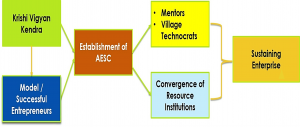
Organogram of AESC
SUCCESSFUL CASES
BANANA ENTERPRISE
Banana enterprise is a successful functional model in AESC, where the below mentioned support is extended from the KVK and mentors for its sustenance.
- Technological interventions
- Capacity development
- Input support-banana special
- Exposure visit to NRCB, Trichy
- Support for establishment of value added production unit
- Innovative product development
- Validation of products
- Support for networking with markets
Products developed
- Banana fibre extraction
- Ropes, handicrafts and pith blocks made from fibre
- Bio growth promoter for crops and cleaning material for floor and cloth wash from sap water
- Banana special which is a micronutrient mixture prepared by the entrepreneurs with the support of KVK and marketed through AESC.
Table 1 provides the numerical figures of skill building activities carried out through AESC.
Table 1: Skill building in banana enterprises (2017-18 to 2021-22)
| Year | No. of training | Total participants | No. of youths |
| 2017-18 | 14 | 684 | 172 |
| 2018-19 | 12 | 598 | 151 |
| 2019-20 | 18 | 84 | 258 |
| 2020-21 | 22 | 1127 | 317 |
| 2021-22 | 28 | 1456 | 409 |
| Total | 94 | 4711 | 1307 |
Totally 1307 youths were covered, and 37% banana value added products developed.
Box 2 provides an example case of a mentor who is a sustained banana entrepreneur.
| Box 2: Case study of mentor Mr M Prasath Place: Madeshwaran Kovil Street, Gobi-638452, Expertise in: Banana fibre, fibre mat, pith, block, sap water, natural dye and handicrafts Brand name: SP GRACE Natural Experience: Eight years Mr Prasath is a young entrepreneur residing in Gobichettipalyam. He was trained on banana fibre extraction in 2008. Starting with a production of 150 kg fibre, his production expanded to 1 ton per month. From fibre, he developed rope and handicraft materials; and from pith he developed banana pith blocks. From sap water, he is producing a bio growth promoter for crops as well as cleaning material for floors and clothes. He is a member of AESC. Initially he marketed banana fibre and its by-products at local markets. Later, he started marketing these abroad with the brand name of SP Grace Naturals. Quality analysis was done for his products by scientific institutions. He participated in state and national level exhibitions and melas. He is earning Rs. 45000/month through this enterprise. He gets invited as a master trainer on banana fibre-based products by various universities, research, and skill-based institutes. Outcome and impact
|


Handicrafts made from Banana Fiber, SAP Water products & Sanitary Pad
MILLET ENTERPRISE
Under this functional model, the following support was provided by KVK and mentors to entrepreneurs and village technocrats. (The technocrats are the trained Community Resource Persons promoted by KVK. They disseminate technologies and services at the grassroot level on bee keeping, organic farming, millet value addition, banana value addition, artificial insemination, etc.).
- Skill training
- Varietal demonstrations
- Exposure visit
- Establishment of value addition unit
- Standardization of value-added products
- Convergence with resource institutions
- Product development from millets (developed primary products such as grains from millets secondary products such as flour, nutria mix, biscuits, flakes and other confectionaries)
- Maintenance of quality standards of value-added products (grading, branding, certification)

A case of a successful mentor in millet enterprises is presented in Box 3.
| Box 3: Case study of mentor Mrs E Kavitha Place: Anupparpalayam, Sadhumugai post, Sathy taluk, Expertise in: Millet-based products Brand name: AARA License: FSSAI Experience: Five years Recognition: TNAU TBI-Ideathon AwardOutcome and impact
|

HONEY ENTERPRISE
Like the banana and millet enterprises, honey enterprise is also one of the proven successful agripreneurship models promoted by AESC. Table 2 has the details.
Table 2: Cluster promotion through honey enterprise
| Cluster area | No. of youths | No. of boxes | Average production/month |
| Gobichettypalayam | 7 | 240 boxes | 205 kg |
| TN Palayam | 9 | 102 boxes | 87 |
| Anthiyur | 4 | 60 boxes | 35 kg |
| Perundurai | 2 | 30 boxes | 23 kg |
| Total | 22 | 432 boxes | 350 kg |
To scale up this model, the mentors and the KVK have extended support to village technocrats, farmers, and entrepreneurs in the form of skill training, exposure to model bee farm, support with bee boxes and accessories, technical follow up and advisory services, value addition and marketing, standardization of value-added products, together with convergence with resource institutions. It has also promoted product development (honey and other value-added honey products), branding and certification. Box 4 shows the case of a successful mentor under this model.
| Box 4: Case study of mentor Mrs Manjula Parthiban Place: Kolapalur post, Gobi taluk, Erode District Expertise: Honey, value-added products, accessories manufacturing Brand name: Manjari License: EO License, FSSAI approval, approved trademark Experience: 12 years Recognition: Member of National Bee BoardValue-added products developed from honey are: honey storage tank, pure honey, honey with dry fruits and nuts, honey amla candy, honey wax, honey chocolate, and bee pollen.Outcome and impact
|
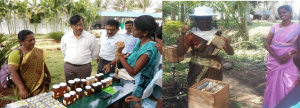
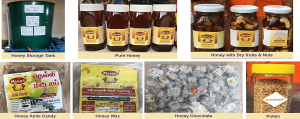
DESI BIRD ENTERPRISE
The desi bird enterprise has proven to be a sustainable livelihood model for youth, which is promoted through AESC offering the following support.
- Technological interventions/approaches
- Skill training (desi bird rearing techniques)
- Demo units (desi birds; azolla, EVM; termite production)
- Extension activity (publications, SMS, exhibitions, advisory services);]
- Supply of quality chicks (desi chicks)
- Support for establishment of units (hatchery unit, feed mixing unit)
- Dissemination of farm innovations (low-cost incubator and egg embryo detector)
Table 3: KVK’s interventions
| Name of the intervention | Method of approach | No. of units established | No. of youths covered |
| Hatchery unit | Group | 3 | 75 |
| Feed mixing unit | Group | 2 | 60 |
| Azolla/termite production | Demonstration/individual | 110 | 110 |
| Egg embryo detector | Individual | – | 75 |
| Ethno veterinary garden | Demonstration/individual | 6 | 30 |
| New varietal-desi chicks | Demonstration | 40 | 40 |
| Desi bird production | Individual | 75 | 75 |
| Box 5: Case study of mentor Mr Natarajan Place: Uthandiyur Post, Bhavanisagar, Sathy taluk Expertise: Egg, meat, desi bird rearing, dog breeding, azolla cultivation, hatchery unit Experience: Six years Recognition: Mahindra Samriddhi AwardOutcome and impact
|


IMPACT
The AESC has 436 members in three categories: (i) Farm-based enterprises (143 members); (ii) Livestock enterprises (82 members); and (iii) Value-added products enterprises (211 members). Among these enterprises, KVK has developed 84 mentors who train and provide handholding support to budding entrepreneurs.
- 84 mentors developed by AESC are spread across the state (not restricted just to Erode district).
- 26 mentors received awards and recognition from TNAU and other reputed private companies for their achievements and replication of their models.
- AESC supported 17 members to showcase their products in social media, such as Krishi Jagran, Pasumai Vigadan and Aval Vigadan (especially for women entrepreneurs) for their business expansion.
- Agripreneurs participated in 23 Exhibitions organized by government departments and colleges. They invite AESC for wider reach so as to promote entrepreneurs among farmers and youth.
- AESC conducted 35 skill-based capacity building programmes for farmers, entrepreneurs of Erode and other parts of the district with technical support from KVK. Totally 1257 members attended and benefitted.
- Created networking among mentors and members for exchanging their ideas, and raw materials for individual enterprises development.
- AESC supported its mentors with bankable projects for the amount of Rs. 1,20,00,000/- for 15 members for dairy farming, goat rearing and fisheries.
- Due to the facilitation and networking of AESC, members could realize enhanced income ranging from Rs. 5,000 to Rs. 85,000/per month based on the enterprises.
- AESC paved a platform for ARYA members to expand their business opportunities.
LESSON FROM IMPLEMENTATION
KVKs across the country – if they are keen on promoting entrepreneurs in the field of agriculture – can replicate this functional model with the necessary adaptations. Identification and handholding of mentors in varied sectors is crucial for promoting agripreneurs. Stakeholders in the agriculture and allied sectors can make use of this platform to support budding entrepreneurs by converging their ongoing programmes/services in the district. Recognition, awards and resource support through ongoing schemes could be used to motivate agripreneurs, but they also need new business ideas, technological innovations and publicity to strengthen their enterprises. Bankable projects in different enterprises can be developed and compliance carried out by the institution to support the members to get the necessary financial linkages from banks and government departments.
Many KVKs organize skill training on different aspects. To help these trainees to apply these skills, handholding support is important, and this should be provided. Only through the development of centres such as AESC can we ensure sustainability and further development of new enterprises.
 Dr. P Alagesan, Senior Scientist & Head, ICAR-KVK-MYRADA. He can be reached via email: P.Alagesan@icar.gov.in; myradakvk@gmail.com
Dr. P Alagesan, Senior Scientist & Head, ICAR-KVK-MYRADA. He can be reached via email: P.Alagesan@icar.gov.in; myradakvk@gmail.com
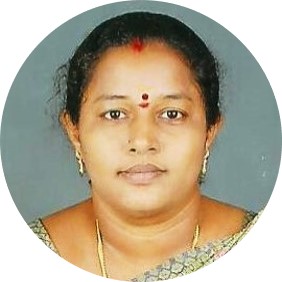 Mrs. M Siva, Scientist (Home Science) at ICAR-KVK-MYRADA. She can be reached via email: myradakvkhs@gmail.com
Mrs. M Siva, Scientist (Home Science) at ICAR-KVK-MYRADA. She can be reached via email: myradakvkhs@gmail.com

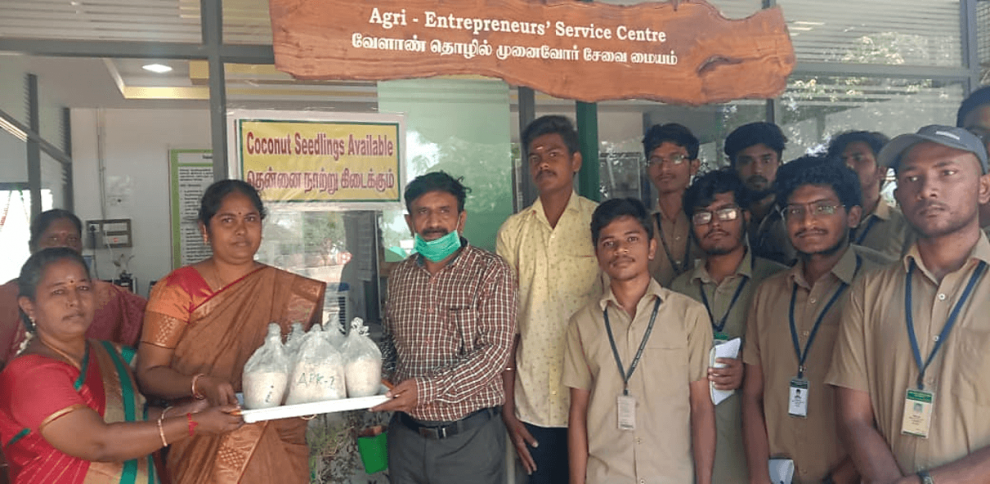
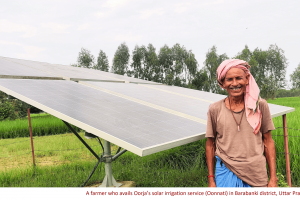
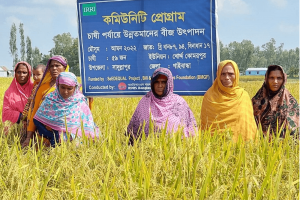
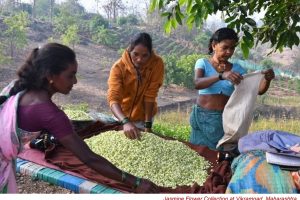
“Many KVKs end up with organising training programmes to impart knowledge and skills on various aspects in crop and livestock farming. But the trainees need support to establish themselves as entrepreneurs in the areas where they acquired skills through training.
It is in this context KVK managed by MYRADA at Erode is doing a commendable job by establishing Agri Entrepreneur Service Centre to provide support to the trainees.
Congratulations to Dr. P. Alagesan and Mrs M.Siva on promoting enterprises in both crop and livestock sectors. Other KVKs especially in Tamil Nadu can explore the possibility of replicating this successful model. Similarly this KVK also can also gain a lot from the KVK, Namakkal which is implementing several successful programmes in addition to Fodder Development programme under PPP mode (Kindly see, AESA Good Practices Note 36.).
Thanks to AESA for posting in the site”.